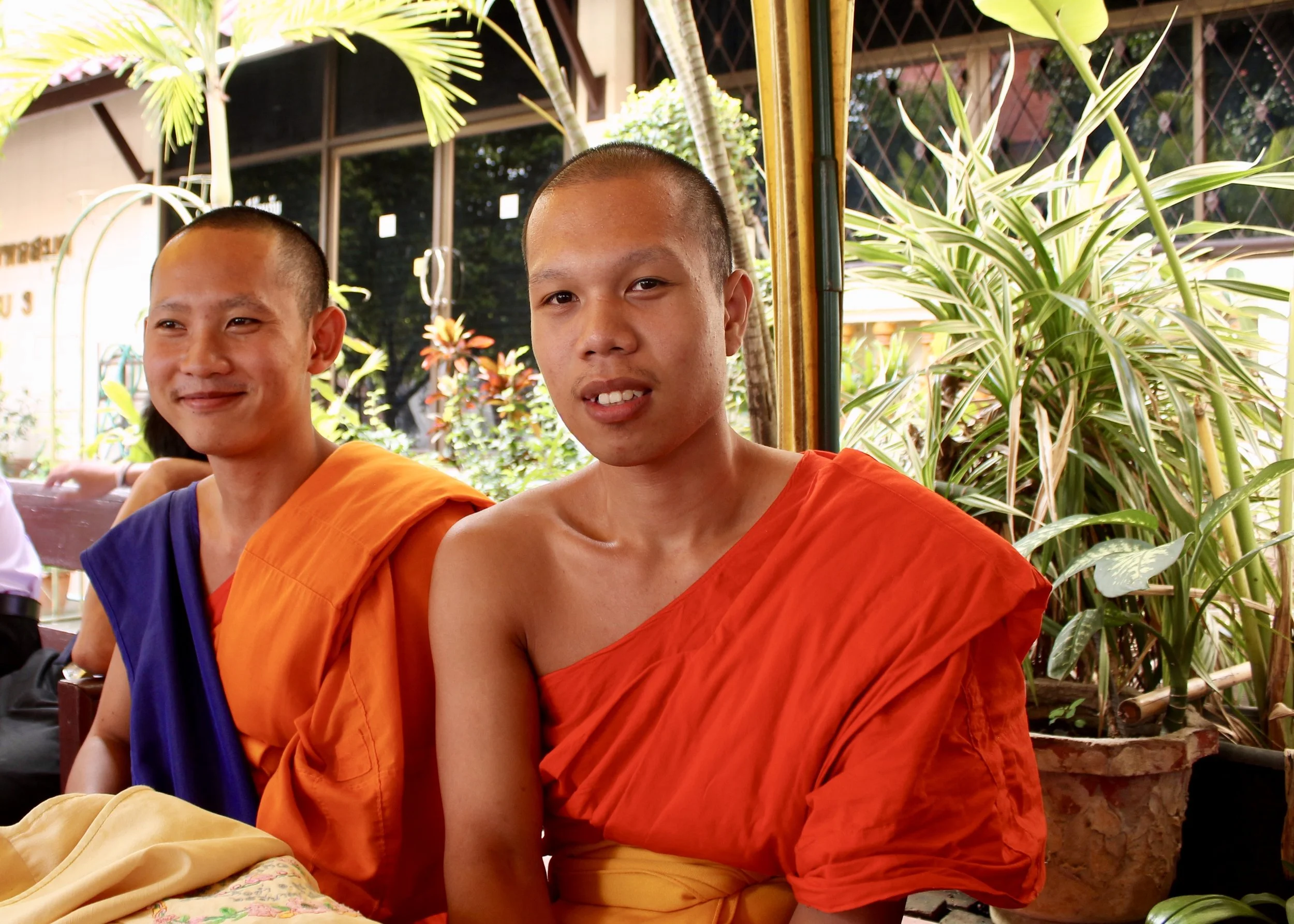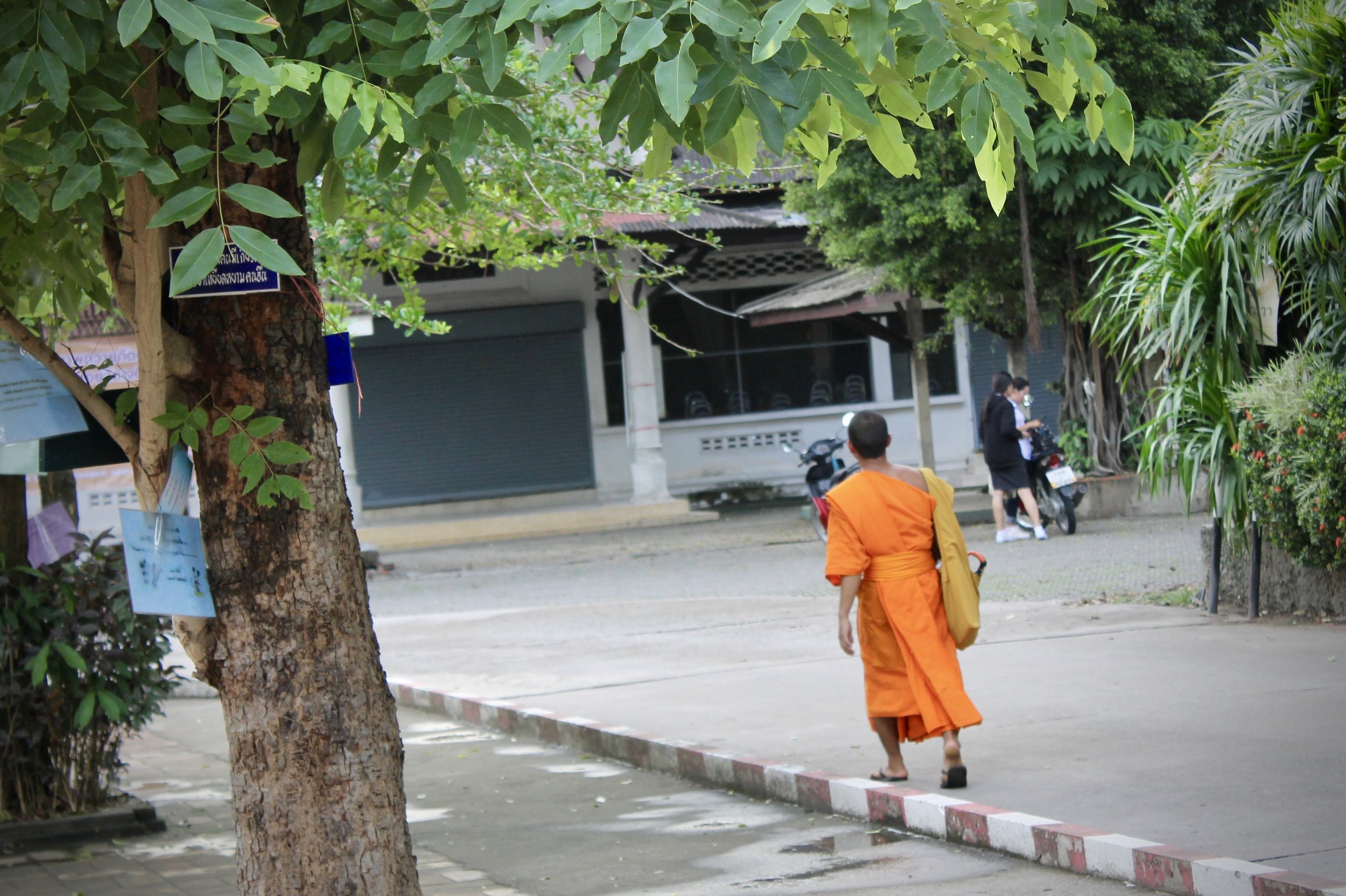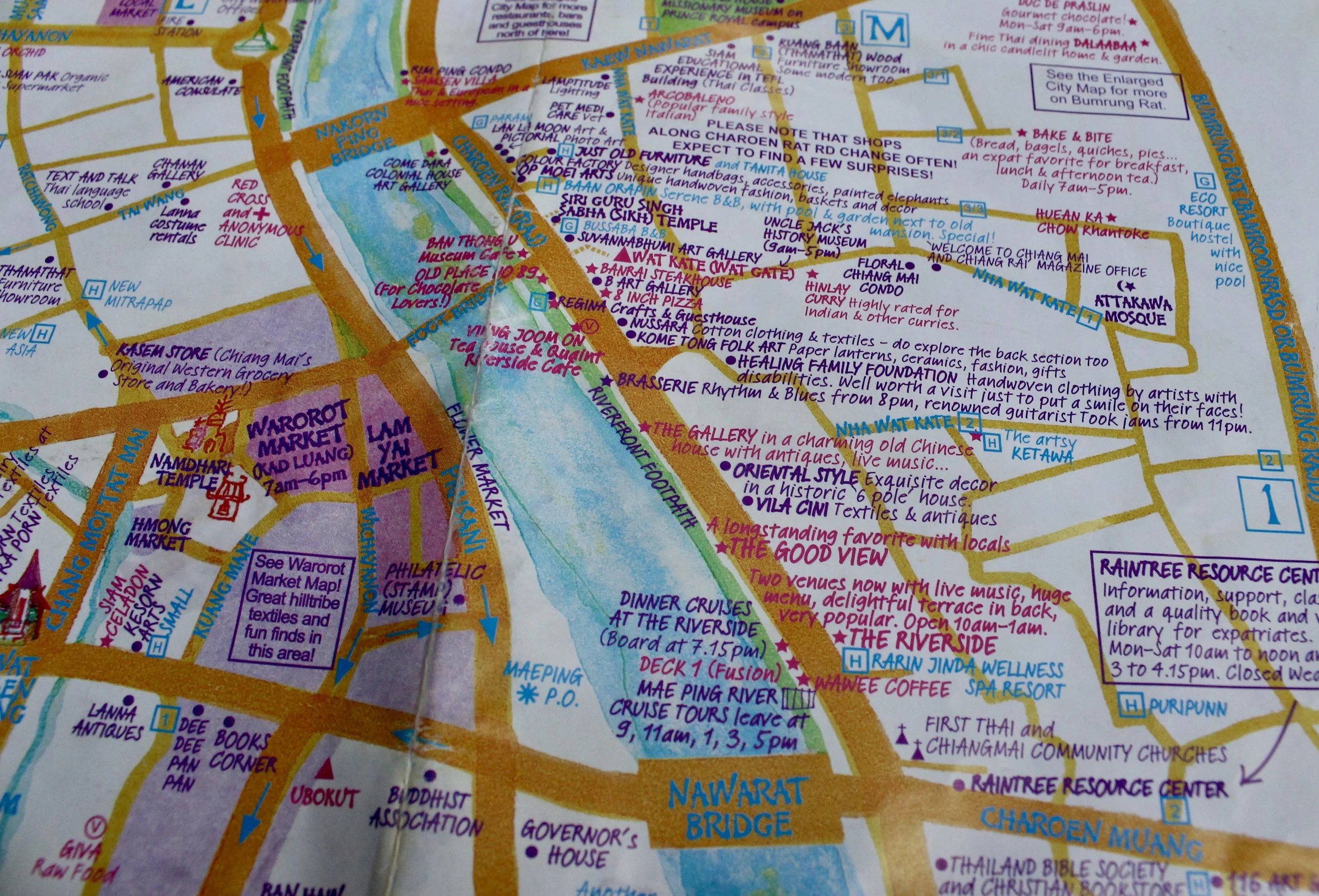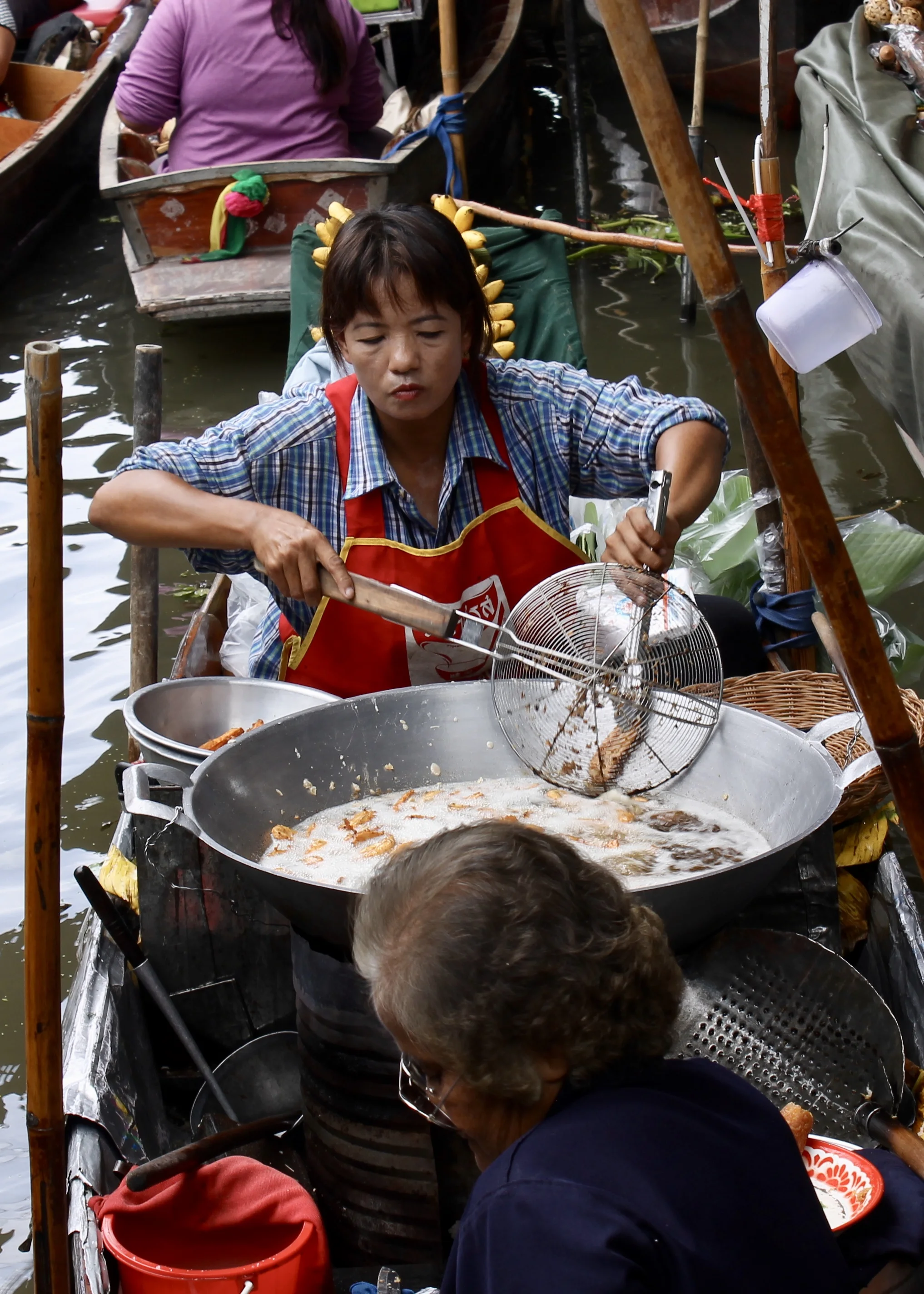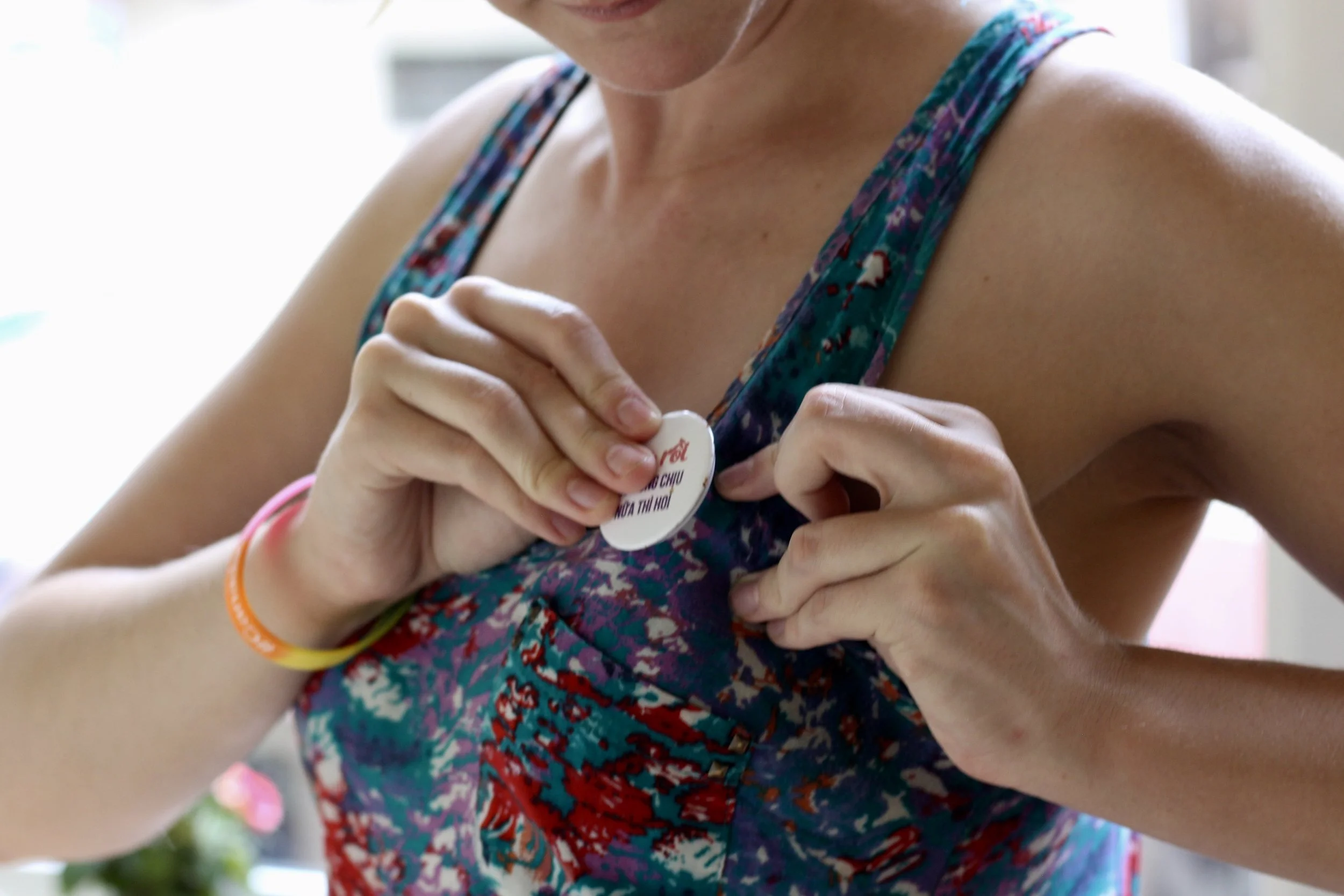10 Questions with Teenage Monks
At the Buddhist Temple in Chiang Mai called Wat Chedi Luang Worawihan, Louise and I interviewed three novice monks, or nen. Korowit Cheemue (20), Chatuporn Nimol (19), and Takdanai Lamnoy (19) left their families and began their Buddhist studies as orange-clad nen when they were 13-years-old. We discussed their monastic rituals, the protective power of tattoos, and what it’s like to chant ancient Pali instead of play football.
What is your daily schedule like?
Korowit: At 5am, we shanti [meditate and chant] for one hour. Then we walk around the city to collect alms and receive food. I go to the same spot every morning. People always give us food. Then we have breakfast at 7am. Afterwards, we study Buddhism. We translate Pali scriptures and stories to Thai, and it’s very difficult. It’s an old language, around 2,560 years old.
Takdanai: So we speak Thai, Pali, and English. Pali is definitely the hardest.
Korowit: If we make the wrong translation from Pali to Thai more than three times, we have to start all over again. It’s so difficult. We do this for three hours every day. After that, we eat lunch.
What’s your favorite thing to eat?
Takdanai: Fried rice—it’s easy!
Korowit: You should try Larb Gai [spicy, chopped chicken salad with mint and basil] when you’re here. That’s delicious.
You left your family when you were 13-years-old, which was 5 or six years ago. How often do you talk to them or see them?
Korowit: We talk maybe twice a month. We each have our own cell phones we can use. They sometimes come to visit, but my village is three to four hours away. My sisters study in Bangkok.
Korowit spoke great English, and his curiosity about American life sparked conversations ranging from what power lines look like in the United States to how much money we make.
It’s only required for men to live the monastic life and study Buddhism in Thailand. Can women be monks? Would your sisters study Buddhism?
Korowit: No, my sisters don’t study Buddhism. My sisters live the simple life in Bangkok, like you. Women can be monks, I think [they’re called nuns]. But not in Thailand. In other countries though—Sri Lanka and Myanmar. No Buddha women in Thailand.
Mel: Why not?
[The three young men discussed this amongst themselves for a few minutes before they could figure out how to respond in English]
Korowit: They don’t have leaders. There aren’t any women teachers or Buddhist community leaders.
When I was in Thailand four years ago, I stayed in a Karen village up north. Some of the older monks had many tattoos. Is tattooing part of Buddhism?
Takdanai: That’s where we’re from! Many of us are from that region. Yes, some monks have tattoos, but it’s not required.
Korowit: Tattoos are magical. They are used to protect the power in the body, protect the spirit. Modern Lanna people still do it, and yes, some monks still get a lot of tattoos.
Why do you wear orange robes?
Korowit: They are “iss sheen.” I don’t know how to say…itchy! We wear these everyday.
There are two types of monk: city monk and forest monk. City monks wear bright orange, like mine. Forest monks wear darker orange, like brown. Because it doesn’t show dirt!
What’s the hardest part about being a monk?
Chatuporn: I’m a teenager, but I don’t have the freedom to explore what I like. I want to play football or soccer. But I can’t.
Do you think you’ll be a monk forever? If not, what would you do afterwards?
Chatuporn: We’re studying to become English teachers. We study English from noon to 5pm at the university. And we talk to visitors everyday to practice our English. This is the only time we get to speak English.
Korotwit: Yes, in our free time we practice English, too. Cat, cat, cat, cat. Practice the “t” sound.
Takdanai: You can come and go as a monk. You can leave whenever, and you can come back. It’s not a bad thing. It’s not looked down on.
Photo Credit: Louise Heffernan.
Here, the boys had written out their English and Thai names, and they're helping me pronounce them. We all wrote down many words to help each other understand. Chatuporn (center), Takdanai (right), and Korowit (only hand pictured, left) laughed a lot at our attempts to converse.
What else do you do in your free time?
Korowit: We watch movies. My favorite is Pirates of the Caribbean.
Chatuporn: I like Game of Thrones [this is followed by lots of laughing].
What’s the most important thing about Buddhism?
Chatuporn: I would say to purify the mind. Have one mind. That’s the heart of Buddhism.
Also, do good. And don’t do bad.
Photo Credit: Louise Heffernan.
This is the main temple at Wat Chedi Luang Worawihan, where we held our monk chat.
We arrived in the middle of an afternoon shanti.
Takdanai writes his name for me. He was the quietest nen, focusing more on listening than on volunteering his own story. He is an only child, and he talked the most when he talked about his village.
This sign near the main temple made me think of Chatuporn. All monks wear the same thing, have the same hair, and do the same thing every day. Chatuporn desired freedom to explore his interests, and he was the one who didn't hesitate to talk about his goals after monastery life. He's also the one who liked Game of Thrones. Though Chatuporn seemed to struggle the most with the limitations of monastic life, he also waxed poetic when describing how Buddhism frees your mind.
Bye Korowit! After our monk chat, Korowit walked back to his living quarters at the temple. Takdanai and Chatuporn lived at other nearby temples.
Editor’s Note
Korowit, Chatuporn, and Takdanai study English at a university in Chiang Mai, and Louise and I speak maybe a total of 10 Thai words. Our interview took nearly two hours, and some things certainly got lost in translation.
These three young men represent one of the norms in Thai Buddhist society. All men must study Buddhism as nen at some point in their life. Some shave their heads, wear orange robes, collect alms, and live in temples studying Buddhism for a few days, while others live as nen for more than 20 years to become a revered monk leader in their communities. It’s common for young teenagers from hill tribes to go to bigger cities like Chiang Mai to study Buddhism as nen for five to six years—it’s their key to free education and more opportunity.
They were also interested in our lives in the United States, asking us many questions in return. Louise and Chatuporn bonded over watching Game of Thrones (this was a major surprise to me that he watched such a violent and risqué show, and I’m still wondering if we translated this incorrectly). We compared power lines in the two countries, because there are dozens of cables and wires on Thai power lines. Korowit was very curious about our electrical system and underground cables. The boys also asked about our careers, salaries, learning English, and whether or not Louise would take her hiking skills to Mt. Everest.
Our biggest mistranslation was when we asked about “Chang”—we were referring to the brand of beer, and they answered talking about the sacred elephant.
By Mel Grau

